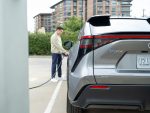
How a $1.05 Billion Loan Could Supercharge EVgo’s Charging Network
As electric vehicles (EVs) rapidly move from niche to mainstream, the race to expand the charging infrastructure intensifies. In a significant development for the EV world, the U.S. Department of Energy recently announced a conditional loan guarantee of up to $1.05 billion for EVgo, a leading company in the EV charging space. This landmark deal promises to catalyze the build-out of 7,500 high-powered charging stalls across 1,100 stations nationwide, with a special focus on marginalized urban communities.
A Major Boost for EVgo
This conditional loan guarantee is a lifeline for EVgo, a company that’s currently facing challenges related to high capital costs. With this support, EVgo is set to become a more formidable player in the EV charging sector, helping it compete against industry giant Tesla and its already-established Supercharger network. Jigar Shah, head of the Department of Energy’s Loan Programs Office (LPO), emphasized that this financial support will enable EVgo to enhance its customer service. In turn, this should drive higher utilization of its chargers and, ultimately, help EVgo pay back the loan faster.
Currently, EVgo operates over 3,500 fast charging stalls. With this infusion of government-backed funding, the company plans to double its capacity and make a significant leap toward profitability.
The Push for Public Charging Stations in Marginalized Communities
A critical aspect of this plan is EVgo’s commitment to building more than 40% of these chargers in disadvantaged communities. These neighborhoods, often lacking access to private charging solutions like home driveways, will benefit immensely from public charging stalls. EVgo CEO Badar Khan highlighted the importance of providing access to clean air and electrified transport to those underserved by existing infrastructure.
Notably, these chargers will cater to both individual car owners and car-sharing services, further broadening their accessibility and utility in urban environments. This approach aligns with broader federal initiatives aimed at closing gaps in EV infrastructure, ensuring that electric mobility isn’t just a luxury but a widely accessible option for all Americans.
Accelerating a Nationwide EV Infrastructure
The conditional loan to EVgo marks the first financial assistance for an EV charging company from the Department of Energy’s innovative clean energy program. This program, which has roughly $70 billion in loan authority, plays a pivotal role in supporting green technologies. The expansion of EVgo’s fast-charging network will complement a federal effort launched in 2021, which aims to establish EV charging stations every 50 miles along major highways.
However, this federal program has faced criticism for its slow rollout. By injecting private companies like EVgo with significant capital, the government hopes to speed up the process and meet the growing consumer demand for reliable, fast EV charging.
Ali Zaidi, the White House national climate advisor, underscored the importance of this partnership, calling it a key step in building the infrastructure necessary to sustain the burgeoning EV market. “This partnership will help us continue to accelerate expansion from coast to coast,” Zaidi remarked, hinting at the scope and ambition of the project.
Why This Matters
The United States is at a pivotal moment in the transition to electric vehicles, and the success of this shift hinges largely on accessible and reliable charging infrastructure. EVgo’s expanded network, powered by this massive loan guarantee, could be a game-changer, especially for urban and disadvantaged communities that have historically been overlooked.
Moreover, this loan highlights the government’s commitment to fostering a cleaner, more sustainable future. As more Americans adopt electric vehicles, the demand for a nationwide, user-friendly charging network will only grow. Partnerships like this between the private and public sectors will be critical to meeting that demand and driving the country closer to its climate goals.
In the coming years, it will be crucial to watch how this partnership unfolds, not just for the EVgo brand but for the broader EV ecosystem in the U.S. With more chargers, better customer service, and expanded reach, the future of EV mobility is set to become more inclusive and accessible than ever before.


